THE ROSE FESTIVAL |
 |
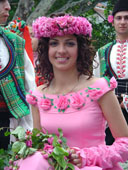 According to history, a celebration in honour of the queen of flowers – ROSE was organized for the first time by the Phoenicians. According to history, a celebration in honour of the queen of flowers – ROSE was organized for the first time by the Phoenicians.For ancient Greece the fragrance of the roses was connected with mythology and legends tell that the red rose gained its colour from the beauty Rosalia’s blood. In Egypt the queen Cleopatra organized gorgeous festivities of beauty and youth, similar to those in Greece, at which the aroma of the rose oil was drifting everywhere in the air. At the time of the Rome Empire, a new meaning and content was given to the special ceremonies in honour of rose, called Rosalii, organized by the Romans. Both graves of the dead people and heads of the liberated slaves were decorated with roses. In that way Rose festivities were turned into celebrations of the free human being and liberty. In the Middle Ages rose also played an important role in the life of the nations. With the formation of the great Islamic country in 7th century, rose and rose water were used in the Arabian rituals and customs, cuisine and prayers. 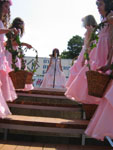 Karlovo Rose Valley is renowned as a centre of rose-growing and rose flower procession, long before the Bulgarian liberation. For many years they were only a means of living but in 1906 Bulgarian and foreign tourists became interested in the attractive rose gardens, magnificent nature and traditional architecture in the region. Karlovo Rose Valley is renowned as a centre of rose-growing and rose flower procession, long before the Bulgarian liberation. For many years they were only a means of living but in 1906 Bulgarian and foreign tourists became interested in the attractive rose gardens, magnificent nature and traditional architecture in the region.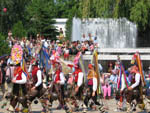 Initially, after the restoration of the Vassil Levski’s birth-house in Karlovo the days 31st May and 1st June / Whitsunday and the Holy Spirit / were celebrated as the day of Levski and in the town a big national fair was organized, gathering people from all over the country. Later, that national fair takes the character of a National holiday and as a result of the coincidence with the spring blossoming of the roses it gradually became famous as the Rose Festival in the Rose Valley (Praznik na Rosata). After 1944 the tradition lost its popularity although people from the village of Rozino celebrated the Rose Festive every May as a local initiative. The first of the holidays was on 3rd May 1957 and the tradition continued 10 years. Eyewitnesses remember the fact that Todor Jivkov attended some of the ceremonies. 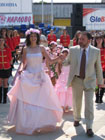 In 1967 with a Ministerial decree the statute of the Rose Festive was confirmed as a national holiday. It was organized annually in the first Sunday of June and the host rights were given to the both rose-growing regions - Plovdiv and Stara Zagora Districts which had to organize the event consecutively. In 1967 with a Ministerial decree the statute of the Rose Festive was confirmed as a national holiday. It was organized annually in the first Sunday of June and the host rights were given to the both rose-growing regions - Plovdiv and Stara Zagora Districts which had to organize the event consecutively.Karlovo was the host of three national holidays in 1968, 1970 and 1972. Since that time Karlovo and Kazanlak Valleys have organized separate celebrations. Through the years, several important events in the programme of the Rose festive have turned into traditions and have won admirations of the Bulgarian and foreign guests: 1. At a beauty contest, preceded by a show-spectacle the “Queen of Roses” is chosen. She is considered to be the most fascinating, beautiful and artistic girl among the candidates. 2. “Rose-picking” ritual (Rozober) is held at the rose gardens near Karlovo. Folklore groups, mummers (kukeri)-wearing scary masks and dance ensembles which recreate the great joy of the coming rose-picking participate in the event. The Queen of Roses awards the best rose-picking workers while they are decorating the guests of the celebration with wreaths and garlands of roses. Afterwards they all taste rose-brandy, rose-jam and rose- liqueur. 3. Procession of youth, beauty and flowers in the streets of Karlovo in which folklore groups and dance ensembles participate. 4. Exhibition-bazaar of the traditional art crafts. 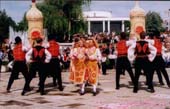 5. Holiday children concerts, brass orchestras with “majoretki“– marching girls and concerts of famous Bulgarian performers and many others. Except thousands of visitors from the Rose Valley, guests at the Festive were the heads of states, notable personalities and politicians from Bulgaria and foreign countries – Todor Jivkov, Fidel Castro, Simeon Sacs Cobburg Gotta and Donia Margarita, ambassadors of other countries in Bulgaria / Japanese ambassador, Russian ambassador, French ambassador and others /, Ministers and National Deputies. |
| Назад |
|
|
|||||
|
|||||
|
|||||
|
|
|||||
|
|
|
|
|||
|
||||||||||
|
||||||||||
|
|
||||||||
Последни безплатни обяви
Кой е на линияВ момента има 392 посетители в сайта |
© 2025 Karlovobg.EU. Всички права запазени.












